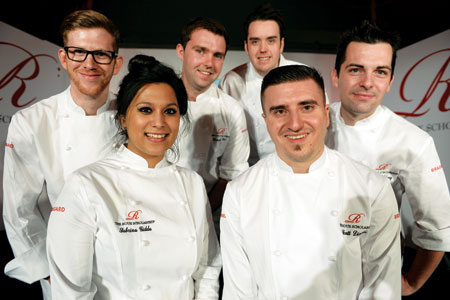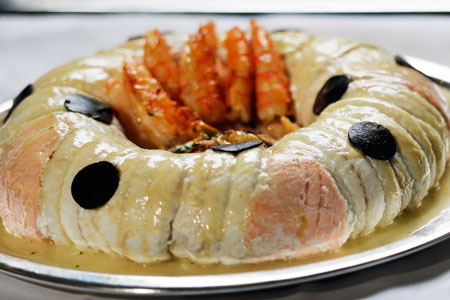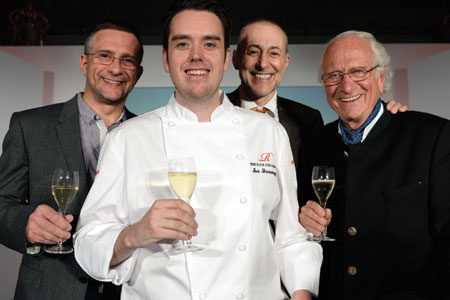Roux Scholarship 2015 winner profile: Ian Scaramuzza
The room has that exam feel - legs twitching with nervous energy below desks strategically spaced safe distances apart; every cough and pen drop amplified off the wooden floors.
But for these six candidates, there's a lot more at stake than a GCSE - this could be one of the seminal moments in their career. For the winner, a three-month stage at a three- Michelin-starred restaurant, £6,000 and a mentorship that could blast them into the top tier of chefs. For the five runners-up, the hope that time is still on their side to have a second crack of the whip.
"This is the day a young chef's life will change forever," says judge James Martin. This is the Roux Scholarship national final.
The 10 judges file into the room and, after a quick briefing, it's more of that exam vibe and the competitors catch the first glimpse of the Escoffier-inspired recipe they must now perfect in order to be crowned Roux Scholar 2015. They have half an hour to write their methodology, during which time they can ask questions and consult cookery books such as Larousse Gastronomique. Then they have three hours to cook the dish of their lives.
Top talent
Now in its 32nd year, the Roux Scholarship has gone on to become one of the most prestigious and well-respected cooking competitions in the world. It's open to professional chefs under the age of 30 and its renown is matched only by its difficulty.
"This is the toughest cooking competition of its type - just look at the previous winners and what they've gone on to do," says Martin.
Alumni include two-Michelin-star holders Andrew Fairlie, chef-patron of Restaurant Andrew Fairlie at Gleneagles in Scotland and winner of the Catey Chef Award in 2014, and Sat Bains of Restaurant Sat Bains in Nottingham, as well as a roster of chefs that stretches from Simon Hulstone, chef-patron of the Elephant in Torquay, to Andre Garrett, executive chef of Cliveden House in Taplow. Not only does the scholarship reward talent - it makes it. One only has to look at the prizes to understand the careerenhancing opportunities on offer.
Sole food
Last year, the dish the chefs had to cook was notoriously difficult - a veal chartreuse. Is this year's turban of sole and salmon - a delicate savarin of salmon mousse wrapped in sole fillets - in the same league?
"There are those who say it's an easy dish - I'm not sure I'd agree," says judge Brian Turner. "We'll be looking at the finesse of the mousse and the marriage of the flavours, the prawns, the mussels, the sauce. When they turn out the mousse it must stand up, but not be so hard that when you hit it with a spoon it bounces back and hits you in the face."
Then there is the lining of the turban: "When you cook a Dover sole the flesh will draw in slightly," says judge Gary Rhodes. "So when layering the turban the chefs need to overlap the fish so that it doesn't draw in and reveal the mousse underneath. We're looking for chefs that may not have cooked this before but will understand that about the flesh of the fish."
With barely enough sole to properly line the turban, chefs could use some of their salmon, but they should be prepared that this will come with its own challenges. "The salmon will cook quicker than the sole, so it will need to be cut thicker," says judge Michel Roux Sr. "A lot of them won't have done that. All those little things make the difference."
Deciding the winner comes down to the minutiae that differentiate a good chef from a great one, says judge Alain Roux. "We are asking them to flavour the mousse with sorrel - an ingredient that not many chefs are familiar with. Will it be too powerful or too weak? Will it maintain its green colour? I think sorrel is one of the hardest herbs to work with."
Plus, the chefs have a whole black truffle, which is not in the recipe, but they must use at their discretion. "There are so many options," says Rhodes. "It could be used purely as a garnish. You could have a truffley beurre blanc, or perhaps it could be shaved into the salmon mousse. It is going to be interesting."
Before the cook-off begins, Michel Roux Sr dishes out a warning - as the time has been extended by 30 minutes from previous years, the judges will not tolerate them plating up late: "Not even two minutes," he says.
Testing time
The competitors are under way at 10-minute intervals. This the final stage of a process that saw them first selected from over 100 entrants and blind-judged on a guinea fowl paper recipe. Then, 18 regional finalists were chosen to cook that recipe, along with a mystery basket dessert.
As the judges prowl the stoves to peek over shoulders, it's not just kitchen skills and wastage they are keeping an eye out for, but also how competitors use the student commis chef they have borrowed from Westminster Kingsway College.
"Cooking is about working as a team, and we are looking at how they use [the team members]," says Alain Roux. "There is no point not using them at all, but then you don't want to give them important jobs, such as filleting."
The Rouxs made it clear in the briefing that there is room for individual interpretation, but it is a risk. And while risk might bring reward, it could also backfire. "Would I do a twist?" asks Martin. "Generally, in my opinion, it would be a mistake. You have to know the dish well to be able to do a take on it, and most of these chefs won't have cooked it before."
Turner agrees: "Less is more on this occasion - do what you have to do and get it spot on. It doesn't need bells and whistles."
As the three hours burn away at lightning pace, chefs check, prod and test their turbans - some using skewers held to lips to gauge temperature, others relying on a thermometer.
Three - Sabrina Gidda, Scott Dineen and Richard Pascoe - competed last year, and although judge Michel Roux Jr says this gives a competitive
edge, it matters less when the standard is this high. "I think this is the strongest final we've ever had," says Fairlie, the only past winner to judge at the final. "They are experiencedchefs across the board - you can often pick one or two who might struggle, but not this year."
Turbans emerge one by one to rest - "a crucial step, otherwise - disaster," says Alain Roux. Garnishes are at the competitors' discretion and each dish carries its own personality - some are loaded up with quenelles, others are simpler and more understated. Yet despite Michel Roux Sr's warnings, the timing gets the better of the competitors - plates are frantically dressed and rushed to the hotplate, but only one of the six manages to finish on time.
From there, it is off to the judging room, where fates and futures are decided. Four nervous hours' wait before the winner is announced at the glitzy evening ceremony.
When the moment comes and Michel Roux Sr reads out Ian Scaramuzza's name in front of a packed room in London's Mandarin Oriental Hyde Park hotel, the 29-year-old Hibiscus chef looks like he has been winded as the realisation sinks in that his professional life will never be the same again.
Soon he will have the chance to spend his £6,000 prize and organise his stage at a three- Michelin-starred restaurant of his choice, but for now, he can revel in not only being among a select band of chefs to have graced the national final - fewer than 200 in the competition's history - but a member of an ever
more elite band of 32 who can claim the title
of Roux Scholar.
Judges' opinions on Ian Scaramuzza's dish
"When you ate the whole thing together, the textures were right: the softness of the sole, the richness of the mousse. It had a great flavour about it, but not ignoring the flavours of the prawns and other ingredients - it was a lovely marriage of ingredients and that was the difference. He really did do incredibly well, but in fairness it's probably the closest final we have ever had."
Gary Rhodes
"He thought about what he was doing and used his ingredients well - he used his salmon and sole to line it. What is very important is the whole combination of how it eats. It was not far short of the perfect combination of sauce, lentils, garnish and mousse."
David Nicholls
"It was a perfect display of the skills needed to complete this dish - it was a very good mousse and the lentils were perfect. It was one of the highest standards we have ever seen - none of them made any mistakes that you might expect to happen in the heat of the competition. They all delivered great dishes that we were very happy to eat. It's a fine line, but because he got it right all the way through - he won."
Michel Roux Jr
Turban of sole and salmon Á la marinière
Recipe from the Roux family, inspired by Escoffier "This is one of the dishes I cook in my Chefs' Library [at Le Gavroche, London] as a centrepiece.
It is one of those classic dishes with theatre. And chefs love cooking it because it is classic and uses skills that aren't often asked of them, but we want to keep going. That's what the scholarship asks of chefs - from veal Orloff to whole stuffed fish, these are dishes that push you as a chef."
Michel Roux Jr
"It's a dish that will test technical skills and they will need to be organised as they work through it. Then there is the possibility of being able to express themselves Turban of sole and salmon Á la marinière as they build up the mould for presentation. The family firmly believes that there is nothing better than the classics to build a dish - even a modern one."
Alain Roux
Method To create the turban, line a 26cm non-stick Exoglass savarin mould with sole fillets and fill the lined mould with a sorrel-flavoured salmon mousse.
Cook in the oven au bain-marie. Demould the turban into a suitable serving dish. Garnish the turban's hollow with mussels and prawns Á la marinière. Serve separately Puy green lentils, prepared to your taste, and accompanied by marinière. where fates and futures are decided. Four
nervous hours' wait before the winner is announced at the glitzy evening ceremony.
When the moment comes and Michel Roux Sr reads out Ian Scaramuzza's name in front of a packed room in London's Mandarin Oriental Hyde Park hotel, the 29-year-old Hibiscus chef looks like he has been winded as the realisation sinks in that his professional life will never be the same again.
Soon he will have the chance to spend his £6,000 prize and organise his stage at a three-Michelin-starred restaurant of his choice, but for now, he can revel in not only being among a select band of chefs to have graced the national final - fewer than 200 in the competition's history - but a member of an ever more elite band of 32 who can claim the title of Roux Scholar.
Ingredients
One whole black truffle is to be used to your liking. The following ingredients, and the quantities thereof, can be adapted or omitted, according to preference.
Serves 6
- 4 whole Dover sole, skin on, 700g to 800g each
- 800g fillet of salmon (centre cut)
- 1kg live mussels
- 18 large raw tiger prawns, 25g to 30g each
- 1kg lemon sole bones
- 250g Puy green lentils
- 1 x 40g whole black truffle
- 2 Spanish onions
- 4 shallots
- 4 loose celery sticks
- 4 cloves garlic
- 1 leek
- 200g button mushrooms
- 1 lemon
- 1 fennel bulb
- 1 carrot
- 2 bunches sorrel
- 1 bunch flat leaf parsley
- Thyme and bay leaves
- 300g unsalted butter
- 1 litre double cream
- 6 eggs
- 750ml dry white wine
- 500ml white wine vinegar
- 100ml olive oil
- 100g plain flour
- Fine salt
- Rock salt
- Pepper
- Cayenne pepper
- Paprika
- Cloves
Winner's profile: Ian Scaramuzza
As only the second Scot to win the Roux Scholarship after the inaugural winner Andrew Fairlie, Ian Scaramuzza was taking his third shot at the competition - although in the previous two years he didn't make it past the paper judging round.
However, once through, he had a reassuring face at the final - during the formative part of his career he worked at judge Andrew Fairlie's Gleneagles restaurant, before taking a sous chef position at Hibiscus three-and-a-half years ago and being promoted to head chef after just six months.
Up against three returning finalists, his composure showed from the off: "I'd never cooked anything like that [turban of sole and salmon] before - it was quite daunting," he says. "But once I'd looked it up in Larousse it made a bit of sense. I asked one or two questions of Michel [Roux Sr]
and when he said 'less is more' I knew the style I wanted to do."
In fact, Scaramuzza was the only finalist to ask any questions during the 30-minute briefing, and the only finalist to plate up on time.
"Some of the guys were taking the time to do turned vegetables and I was paranoid that I hadn't done enough, but I stuck to my guns," he says.
What was the most challenging part of the recipe? "Making sure the mousse was cooked. But I'm good at sauces, so that is what I focused on. Some of the judges commented on it [after he won] and I think maybe it gave me an edge."
He already has his eye on Corey Lee's Benu restaurant in San Francisco for his three-month stage - "it's a small restaurant with nowhere to hide" - but in the meantime, he admits to needing time to let his victory sink in. "One of the things I got taught by Andrew was: stay humble. I didn't expect it. You always hope you've done enough, but you never know. So when I heard my name I didn't really believe it."
It is Fairlie who Scaramuzza believes set him on his path to success. Having started his career at a restaurant in Glasgow called House For An Art Lover, working under Ian Mackie, Scaramuzza then moved to Etain, also in Glasgow, before joining Geoff Smeddle at the Peat Inn in Fife.
In 2007 he joined Restaurant Andrew Fairlie at Gleneagles as a commis chef, and was promoted to sous chef three years later at the age of 24.
"I started as a commis, so I learned all the basics there. Andrew and Stevie [McLaughlin, Fairlie's head chef] pushed me and really helped me grow as a chef. But in addition to that, Andrew showed me how to conduct myself within the industry by leading by example."
In January 2012 an opportunity arose for him to join the team at Hibiscus in Mayfair as sous chef. However, within six months he was promoted to the position of head chef. "I love working for Claude [Bosi] at Hibiscus. His approach is totally different from Andrew's, but we have a great relationship.
At Hibiscus it's fast-paced, always changing and Claude pushes you to your limits. "Claude helped me develop myself as a head chef and
manager, and taught me to run the restaurant as if it's my own, which is hard to learn. Coming from Auchterarder in Perthshire to London wasn't hard - I'm originally from Maryhill in Glasgow, so I'm a city boy at heart."
Clearly a loyal employee who has given good length of service to both Fairlie and Bosi, Scaramuzza's career has also included a series of stages - at the Vineyard under John Campbell (then two-Michelin-starred), two-starred restaurants Sat Bains in Nottingham and De Pastorale in Belgium, and the three-Michelin-starred De Leest in Holland. He will also be doing a brief stage at Ferran and Albert AdriÁ 's Tickets in Barcelona later this month.













